Ocean noise and animal bioacoustics research and mentoring
Faculty Spotlight: Dr. Shima Abadi
As a researcher and associate professor of mechanical engineering, Dr. Shima Abadi focuses on acoustical signal processing with an emphasis on ocean noise and animal bioacoustics. Dr. Abadi integrates her research with outreach, teaching, and curriculum development to broaden participation of underrepresented groups, engage undergraduate students in research, and train graduate students to be the next generation of researchers in her field.
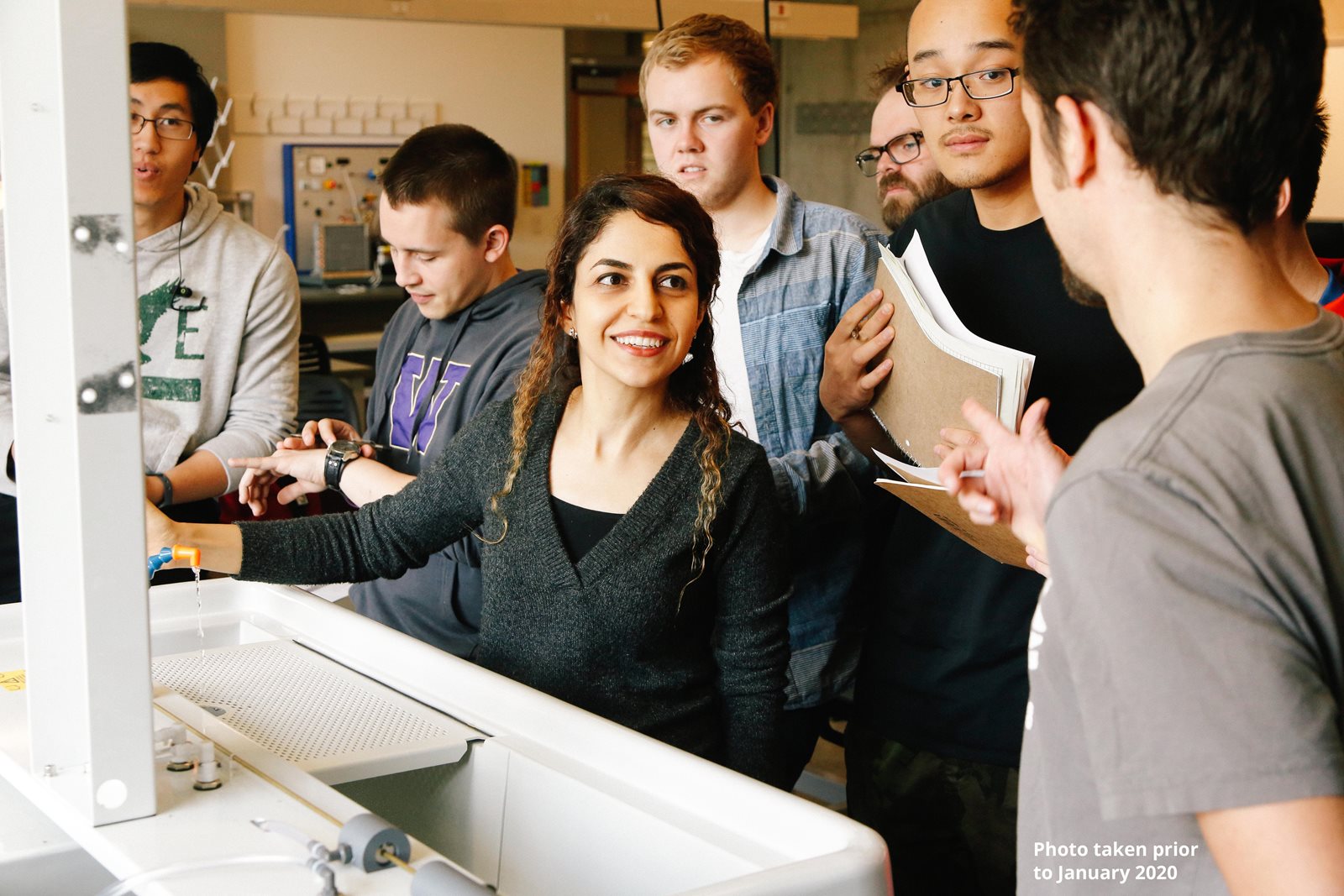
Due to the cross-disciplinary aspects of Dr. Abadi's research it opens up the opportunity to mentor students from several programs such as electrical engineering, mechanical engineering, computer sciences, oceanography, and biology. “I always enjoy training and mentoring students in my research and collaborating with researchers from different disciplines“, says Dr. Abadi.
Bringing her research to UW Bothell
Dr. Abadi joined UW Bothell as an assistant professor in the School of STEM Division of Engineering & Mathematics in 2015. Prior to that, Dr. Abadi was a postdoctoral research scientist at the Lamont-Doherty Earth Observatory at Columbia University and a visiting scientist at the School of Oceanography at the University of Washington from 2013 to 2015.
“I found the UW Bothell structure very unique. Having engineering disciplines and mathematical sciences in one division is perfect for my cross-disciplinary field and promotes collaboration”, said Dr. Abadi.
UW Bothell’s smaller class sizes gives Dr. Abadi the opportunity to directly interact with students, engage them in research while teaching in the classroom, and mentor them from the moment they join our program all the way through their senior capstone projects and graduations (2018 capstone team presenting poster in image to the right). The location of the campus provides easy access to Lake Washington for experiments and collaboration opportunities in ocean science and animal bioacoustics.
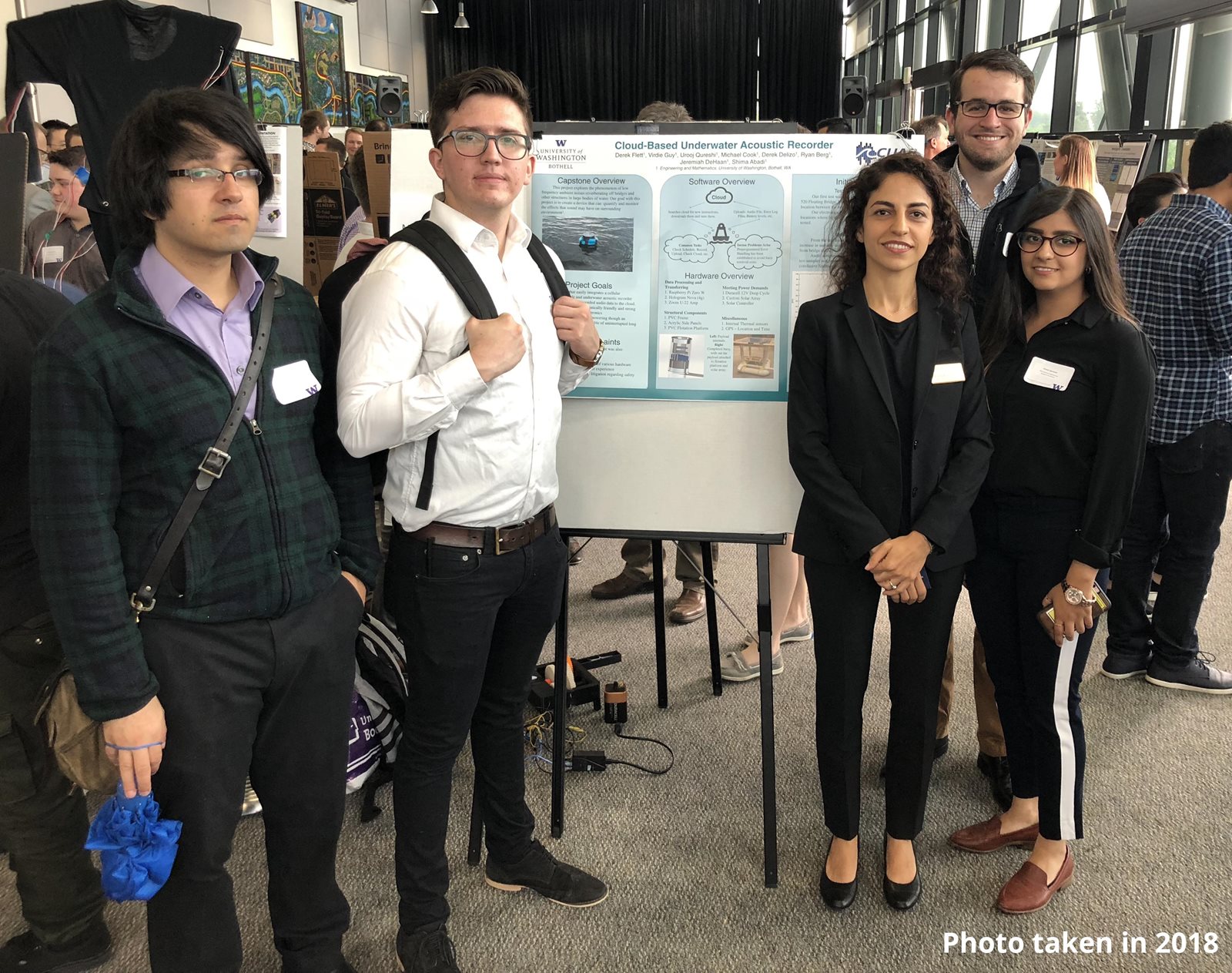
Deeper dive in ocean ambient noise analysis
Over 30 UW Bothell undergraduate and graduate students in the past five year have collaborated and been mentored in Ocean Ambient Noise Analysis, Dr. Abadi’s current research focus. Ocean ambient noise reveals important information about marine life, natural phenomena, and the human footprint in the ocean. Understanding the noise in the Northeast Pacific continental shelf is a challenging task due to the steep continental slope, range-dependent ocean bottom properties from sand in shallow water to silt and clays in the deeper parts, frequent seismic activities in the subduction zone, and volcanic eruptions in the Axial Seamount. Dr. Abadi’s research is part of a $850,000 award from the Office of Naval Research (ONR) UW Bothell shared in the news: Listening to the noise that whales hear.

“Developing a mathematical ambient noise model is not practical in this region due to the complexity of the environment”, Dr. Abadi said. “I take a data-driven approach and leverage an existing, public, long-term ocean acoustic dataset recorded by hydrophone arrays at the Ocean Observatories Initiative (OOI) to characterize the ambient noise in the Northeast Pacific continental shelf, identify its directionality and patterns, and predict future trends of the ambient noise in this challenging environment.”
Funded by the National Science Foundation, the OOI is a global project with eight arrays of sensors in different parts of the world. Two of them are off the Northwest coast.
Python toolbox
Dr. Abadi’s research team most recently published a Python toolbox designed to aid in the scientific analysis of Ocean Observatories Initiative (OOI) data. Their Python toolbox (OOIPY) aids researchers to analyze hydrophone data recorded by the Ocean Observatories Initiative (OOI) in the Pacific Ocean. Students at the UW Bothell and Seattle worked together to develop this python toolbox to help with acquiring acoustic datasets from the OOI Raw Data Server. The raw data isn’t easily accessible so the toolbox provides a way to analyze the data, such as spectrogram (example spectrogram image to the right) and power spectral density plotting.
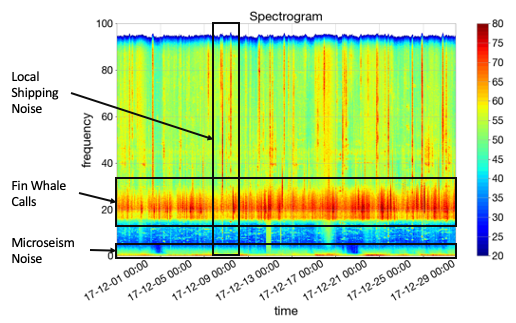
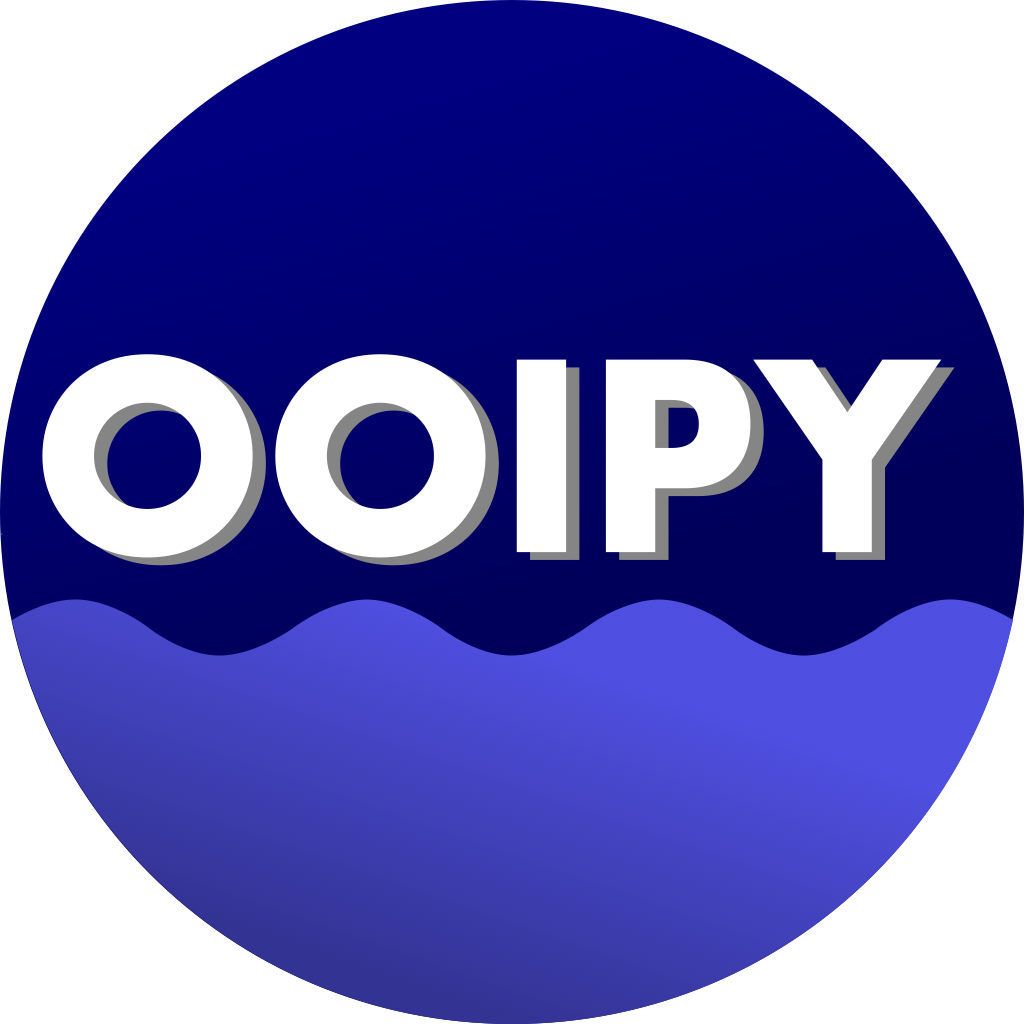
“This is a great example of work that I do in my group to bridge the gap between two campuses and bring my students together to work with each other regardless of their campus and discipline”, says Dr. Abadi.
Adapting to a virtual environment
As a researcher, teacher, and mentor Dr. Abadi is also a mother working from home managing the complexities and demands of work-life. “It’s not easy for sure, and challenging to keep students motivated in a virtual setting”, says Dr. Abadi. To keep students motivated and engaged she came up with a few solutions for her research group students: Instead of one long weekly meeting she schedules multiple short Zoom meetings, holding Zoom group meetings with no agenda to just hang out and talk about non-work related matters (pictured to the right is Dr. Abadi with students during an online social hour). Dr. Abadi also encourages students to attend conferences and seminars to stay up-to-date and interact with other research groups.
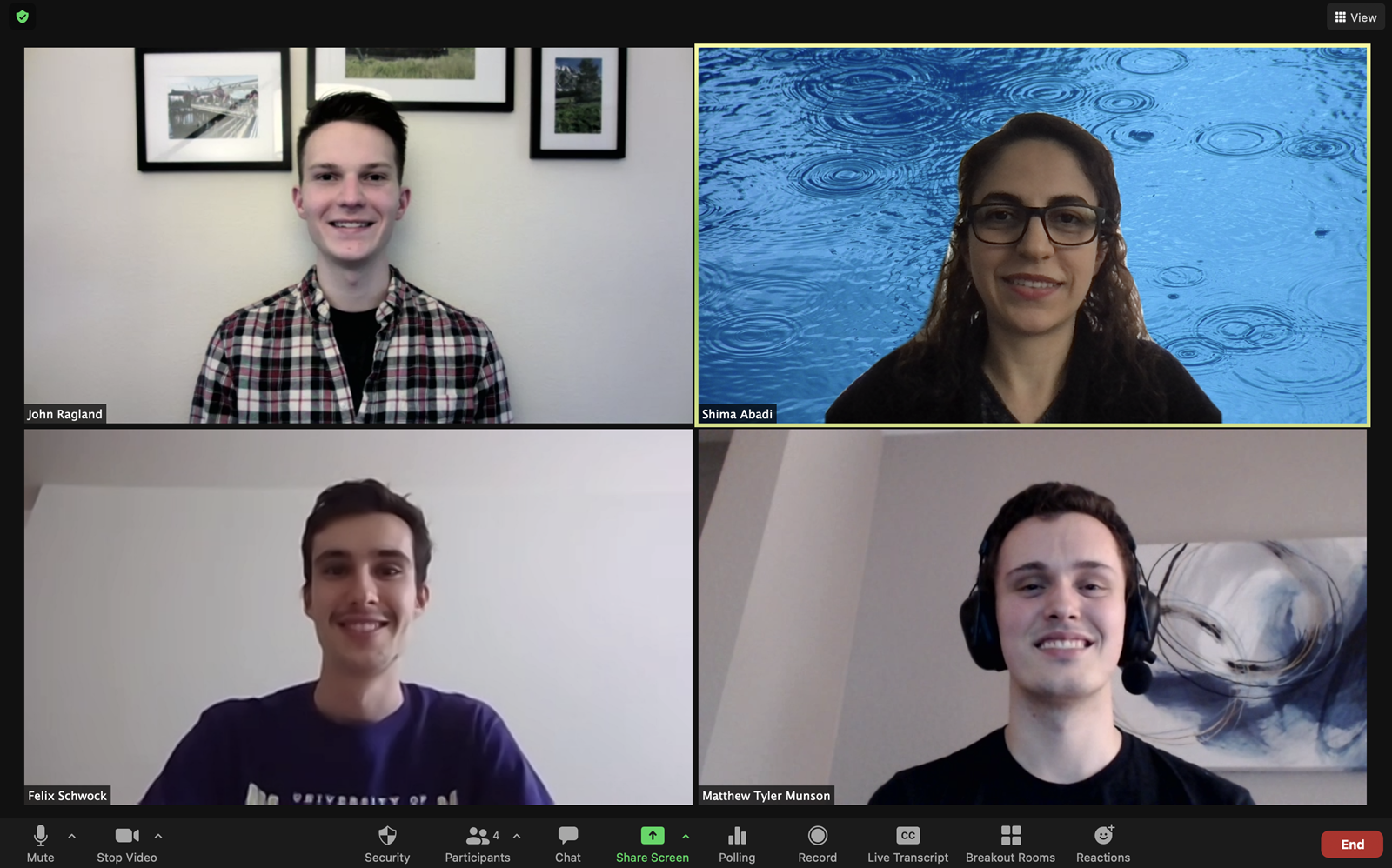
Dr. Abadi traditionally teaches an elective course on the “Introduction to Ocean Sciences and Engineering” (B ME 450) in person but with the pandemic she adapted the curriculum into an online format for winter 2021. As a recently selected participant in the Technology Teaching Fellows Institute, Dr. Abadi will learn new skills for teaching the course online in the future.
Outreach and students conference presentations
Outreach is a way for Dr. Abadi to engage the community in her research, learn and inspire. “I participate in invited seminars and talks to share my research results with others in the field, exchange ideas with the audience to enhance my research, and enhance participation of female students (undergraduates in particular) in hopes of encouraging them to pursue a graduate degree in STEM fields after my talk”, said Dr. Abadi.
At the end of autumn quarter Dr. Abadi gave a seminar for the University of Massachusetts Dartmouth on “Listening to the ocean: sound of rain and wind. As a user of the OOI data, the American Geophysical Union invited Dr. Abadi to give a lightning talk at the Ocean Observatories Initiative Facility Board (OOIFB) Town Hall on the “Analysis of Rain and Wind Ocean Noise”. In April and May 2021 Dr. Abadi is planning to give three more talks: an Applied Ocean Science Seminar for the Scripps Institution of Oceanography at the University of California San Diego, “Listening to the ocean: sound of rain and wind” for the School of Earth and Environmental Sciences at New York Queens College, and “Learning from the ocean soundscape”for the School of Oceanography at the University of Washington.
Students are inspired by their faculty members and Abdai’s abundant research and engagement inspires many to excel at their studies, engage in research and present at conferences. “Presenting at conferences helps my students to stay motivated”, said Abaid. “It is very encouraging for students to see researchers interested in their work, and the feedback from the audience can help them improve their results and come up with new research ideas.”
As part of Dr. Abadi’s research group, UW graduate students Felix Schwock and Eldridge Alcantara presented four talks at the Acoustical Society of America (ASA) conference in December 2020. Topics include “Improving the Performance of the Bartlett Method for Single-Snapshot Direction-of-Arrival (DOA) Estimation Using Signal Processing on Graphs (SPG)”, “Statistical analysis and modeling of rain-generated ocean noise in the northeast Pacific Ocean”, “Modifying the Welch method to estimate power spectral percentiles”, “Statistical analysis and modeling of wind-generated ocean noise in the northeast Pacific Ocean”. Felix Schwock received the best paper award in the Acoustical Society of America (ASA) meeting which was held virtually in Dec. 2020. Schwock’s research paper “Statistical Properties of a Modified Welch Method That Uses Sample Percentiles” was also accepted in the 2021 IEEE International Conference on Acoustics, Speech, & Signal Processing (ICASSP).
Dr. Abadi’s extensive amount of research in acoustical signal processing, mentoring students to be the next generation of researchers, outreach to inspire and lean, and teaching in mechanical engineering is a valued asset to the UW community.
Dr. Shima Abadi recent list of scholarly works & activities
- Event/Presentation: Shima Abadi is invited to give an Applied Ocean Science Seminar at the Scripps Institution of Oceanography, University of California San Diego. Listening to the sound of rain and wind in the ocean, 13 May 2021.
- Event/Presentation: Shima Abadi gave a presentation at the School of Earth and Environmental Sciences, Queens College, NY. Listening to the ocean: sound of rain and wind, 14 April 2021.
- Event/Presentation: Shima Abadi is invited to give a presentation at the School of Oceanography, University of Washington. Learning from the ocean soundscape, 12 April 2021.
- Event/presentation: Shima Abadi gave two lightning talks at the American Geophysical Union (AGU) OOI Facilities Board Town Hall. Analysis of Rain and Wind Ocean Noise, December 8, 2020.
- Publication: Felix Schwock*, John Ragland*, Matthew Munson*, Shima Abadi. OOIPY: A Python toolbox designed to aid in the scientific analysis of Ocean Observatories Initiative (OOI) data (Version v1.0.3). Zenodo, 1 December 2020.
- Presentation/publication: Eldridge Alcantara*, Shima Abadi, Les Atlas. Improving the Performance of the Bartlett Method for Single-Snapshot Direction-of-Arrival (DOA) Estimation Using Signal Processing on Graphs (SPG). Journal of the Acoustical Society of America, 148 (4), December 2020.
- Presentation/publication/award: Felix Schwock* and Shima Abadi. Statistical analysis and modeling of rain-generated ocean noise in the northeast Pacific Ocean. Journal of the Acoustical Society of America, 148 (4), December 2020. Felix Schwock received the best paper award from ASA.
- Presentation/publication: Felix Schwock* and Shima Abadi. Modifying the Welch method to estimate power spectral percentiles. Journal of the Acoustical Society of America, 148 (4), December 2020.
- Presentation/publication: Felix Schwock* and Shima Abadi. Statistical analysis and modeling of wind-generated ocean noise in the northeast Pacific Ocean. Journal of the Acoustical Society of America, 148 (4), December 2020.
- Event/presentation: Shima Abadi presented a seminar at University of Massachusetts, Dartmouth. Listening to the ocean: sound of rain and wind, December 2020.